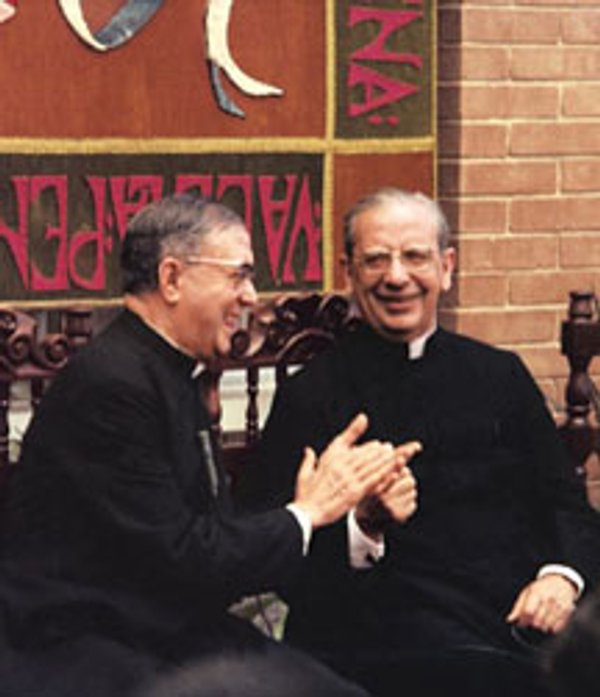Cardinal Camillo Ruini presided on March 5th over the opening session of a tribunal of the Vicariate of Rome in the cause of canonization of Bishop Alvaro del Portillo (1914-1994) who succeeded St. Josemaría Escrivá as head of Opus Dei in 1975.
The Congregation for the Causes of Saints has established that, besides the tribunal of the Vicariate of Rome, a second tribunal of the same canonical competence will be conducted by the Prelature of Opus Dei. The sessions of the latter tribunal will begin on March 20, 2004. These two tribunals will coordinate between them the first phase of the cause, that is, the diocesan investigation on Del Portillo’s life, virtues and reputation for holiness. Once the tribunals have collected all the relevant testimonial and documentary evidence, it will be up to the Holy See to study the cause and issue its judgment.
Del Portillo made a pastoral tour of Canada and the United States in 1983 and 1988, visiting Chicago, Montreal, New York, Toronto, Washington, when he visited some of the major shrines in Quebec and later and many other cities. Speaking to a large crowd in Toronto o on March 6, 1988, he reflected on the motto of the license plates he saw when he arrived in the city: “Ontario yours to discover.” He commented that he was impressed by the many wonderful things to discover here, but “God says to us, I am yours to discover. The Holy Spirit, he said, “moves us to discover when Our Lord is telling us, I’m yours to discover, so that we can tell him, Yes Lord, I want to discover you and your grandeur in the Eucharist and in the Sacrament of reconciliation.”
Alvaro del Portillo was an engineering student when he first met Josemaría Escrivá, Opus Dei’s founder. He joined Opus Dei in 1935. He was later ordained as a priest in 1944, after further ecclesial studies. For many years he was St. Josemaría’s chief support, and then succeeded him as head of Opus Dei upon the saint’s death in 1975.
He moved to Rome in 1946, where he lived the rest of his life. Besides his pastoral work in Opus Dei, he is known for his contribution to the Second Vatican Council (1962-1965), where he served in various capacities. One of his chief interests in this work was to emphasize the role of laypersons in the Church: laypersons are called to bring Christ’s message into family, professional, and social life, turning all aspects of life into occasions for encountering God. He was the secretary of the Conciliar Commission that prepared the decree, "Presbyterorum Ordinis," on priestly life and ministry.
Cardinal Ruini spoke of the desire for a “quick beginning of this cause of canonization” on the part of “so many members of the ecclesiastical hierarchy and of the people of God.” There is “an abundant store of testimonies of people who knew him, among them, those of quite a few cardinals and bishops,” he said. He then added: “The Bishop’s Conference has unanimously expressed its favorable opinion” on beginning the cause.
The vicar of the Pope then spoke of the notable cures and the thousands of other spiritual and material favors attributed to the intercession of Bishop del Portillo, which demonstrate the “spread of private devotion to the Servant of God.”
Besides the cause of Bishop del Portillo, there are seven other causes open for faithful of the Prelature of Opus Dei. These include Montse Grases (1941-1959), a Catalonian student who bore a painful illness with exemplary cheerfulness; Ernesto Cofiño (1899-1991), a Guatemalan pediatrician and father of a family, who exercised his profession with a spirit of great service; and Tony Zweifel (1938-1989), a Swiss engineer.
The Alvaro del Portillo section of this site contains further news, biographical details, testimonies, photos, and some of his writings.
